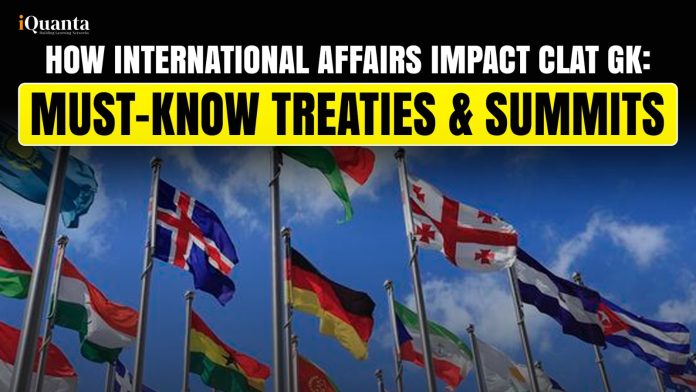The Common Law Admission Test serves as the gateway to the prestigious National Law Universities of India. Qualifying for such competitive examinations requires great hard work and determination. The subjects include English, Logical Reasoning, Legal Aptitude and General Knowledge. Among all these subjects, General Knowledge holds immense weightage and importance as it evaluates the awareness of a candidate regarding national and international affairs. The international affairs section covers the key treaties, global summits, and diplomatic relations between different countries. Understanding the international affairs section is not just about memorizing the facts and treaties; it is more about grasping how the global events taking place are affecting international law. The landmark treaties greatly influence global governance, trade, security and environmental politics, making these crucial topics for the CLAT General Knowledge section. The blog highlights the importance of international affairs and international treaties and also provides strategic tips on how to prepare for the international affairs section.

Role of International Affairs in CLAT General Knowledge
The recently developed international affairs have become an integral part of the CLAT General Knowledge section. Candidates often encounter questions related to international affairs, treaties, agreements and summits to test their knowledge regarding global events. This is exactly why it is extremely important to stay updated on international politics and economics. The Common Law Admission Test often frames questions around all these global affairs and topics. International treaties and affairs are extremely important for the following reasons:
- These international treaties and summits often frame the foundation or base for international law, which is extremely important for CLAT-aspiring students.
- The General Knowledge section in the CLAT Examination consists of current affairs and the frequently asked international issues that make the daily headlines.
- Staying updated on international topics will allow future lawyers to work effectively on international cases if given the opportunity.
Key Treaties for Every CLAT Aspirant
Treaties are formal agreements between countries and their influence on international law. Several key treaties which are essential for the CLAT Examination are given below:
| The Paris Agreement (2015) | The Paris Agreement was adopted by the Union Nations Framework Convention on Climate Change (UNFCCC) aiming to limit the global warming below 2 degrees and reduce the greenhouse gas emissions and move towards sustainable development. |
| The Treaty on the Non-Proliferation of Nuclear Weapons | The Treaty on the Non-Proliferation of Nuclear Weapons was signed in 1968 to prevent the promotion of peaceful use of nuclear energy. |
| The Geneva Conventions (1998) | This consists of four treaties to establish the standards for humanitarian treatment in wars. These focused on protecting the civilians of war during armed conflicts. |
| The Rome Statute (1998) | The Rome Statute established the International Criminal Court to try criminals for crimes such as genocide, war crimes. |
| The United Nations Charter (1945) | This was a foundational treaty that established the United Nations and determined its purpose, structure and operations. It focused mainly on promoting basic rights for humans, and security. |
Key International Summits for Every CLAT Aspirant
International Summits result in shaping the political and economic growth of the countries. Many of these summits often result in forming of significant treaties that influence the global relations between countries. The frequently asked summits in the CLAT Examination are given below:
| The G7 Summit | The G7 Summit primarily consists of 7 major countries: the United States, Canada, Japan, Germany, United Kingdom, France and Italy. The Summit takes place to focus on global issues such as climate change and international security. |
| The United Nations Climate Change conference (COP) | This is an annual conference organized by the UNFCCC to discuss the critical global climate policies and shaping the international climate agreements. |
| The World Economic Forum (WEF) | This is an annual meeting which takes place in Davos, Switzerland where leaders from different backgrounds such as business and academia discuss the global economic issues. |
| The ASEAN Summit | The Association of Southeast Asian Nations (ASEAN) summit takes place to bring close leaders from different Southeast Asian Countries to discuss the regional issues among them such as trade and economic cooperation between them. |
| The BRICS Summit | The BRICS Summit takes place to bring about five independent countries Brazil, Russia, India, China and South Africa to focus on emerging issues of international security and economic growth and reform global institutions. |
How to Prepare the Current Affairs Section in CLAT General Knowledge
Candidates must realise that general knowledge section holds immense important in the CLAT Examination so here are some tips to keep up with your preparation:
- Focus on reading newspapers to stay informed on global affairs and treaties and also try following international News channels such as BBC and Reuters.
- Mark the key treaties and make a list of them to study about their implications.
- Understand the role of India in global treaties and summits.
- Remember to take mock tests and quizzes to regularly test yourself on the updated information.

How International Affairs Impact CLAT GK – FAQs
International affairs play an important role as they test a candidate’s awareness of global treaties, diplomatic events and agreements that further shape international law and relations.
Candidates must focus on all the major treaties such as the Paris Agreement, NPT, Geneva Conventions and the Rome Statute as these all treaties have a major impact on global law and are the commonly asked questions in the examinations.
The major international summits include the G7 Summit, Climate Change Conference, World Economic Forum and the BRICS Summit as all these are the major topics in the examination.
India plays a major role in international affairs as it holds a diplomatic stance in international affairs. Therefore, candidates must effectively prepare for this topic for the examination.
Candidates can try summarizing the treaty’s purpose, impact and the major countries involved in the treaty. Understand India’s position in each treaty for a better understanding of the concepts.

